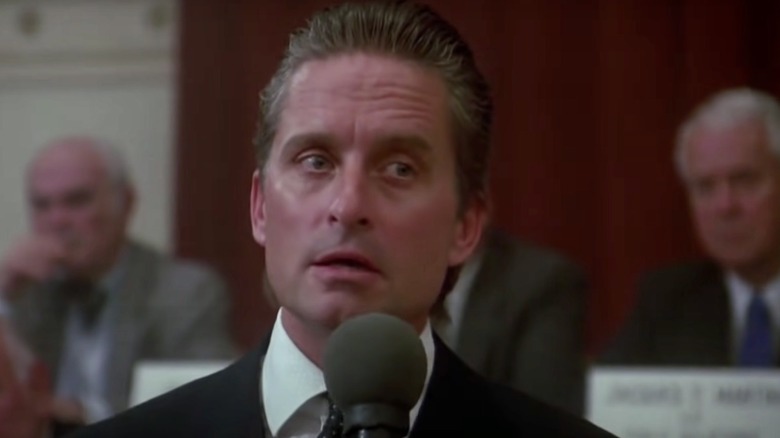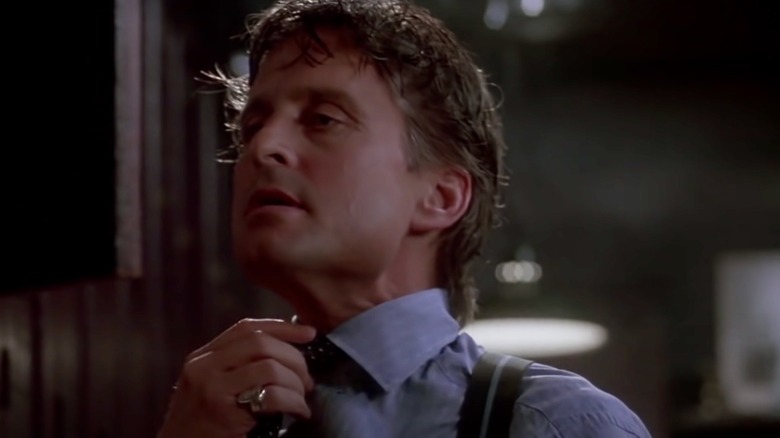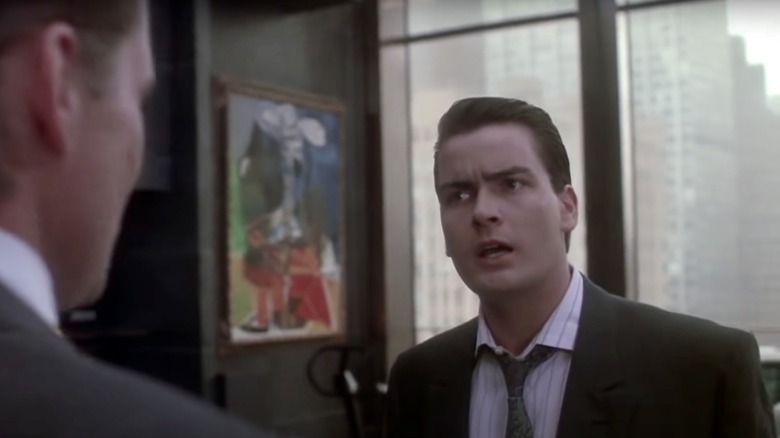Gordon Gekko's Famous 'Greed Is Good' Line Was Inspired By An Actual Wall Street Criminal
"Greed is good." This is a simplified version of the well-known quote attributed to the character Gordon Gekko, described as a "trader and raider" in Oliver Stone and Stanley Weiser's script for the movie "Wall Street." The full quote, "Greed, for lack of a better word, is good," made the American Film Institute's list of the 100 greatest movie quotes of all time. It comes during a monologue that Michael Douglas gives in his Oscar-winning performance as Gekko in the film.
Speaking into a microphone to a room full of stockholders, Gekko argues that greed "captures the essence of the evolutionary spirit," that it's "marked the upward surge of mankind," and that it will save the "malfunctioning corporation called the USA." His words are almost dangerously persuasive, as the stockholders proceed to smile and give the very concept of greed a round of applause.
While this scene may seem like a heightened moment of movie drama, Gekko's words were based on those of an actual Wall Street criminal. In December 1986, the Chicago Tribune detailed remarks that real-life insider trader Ivan Boesky had once given in a commencement speech at the University of California, Berkeley's business school. That same month, Boesky made the cover of Time magazine as "Ivan the Terrible," the investor "making millions with your money." For his shady dealings, he was forced to pay a $100-million government penalty. Yet when he appeared at UC Berkeley the year before, it was as the guest of honor.
Under the familiar-sounding headline of "A $100 Million Idea: Use Greed for Good," the Tribune quoted Boetsky as saying:
”Greed is all right, by the way. I want you to know that. I think greed is healthy. You can be greedy and still feel good about yourself.”
The art of the steal
Newsweek magazine (via the aforementioned Chicago Tribune) reported that Ivan Boetsky's "Greed is all right" speech was "greeted with laughter and applause" at Berkeley in 1985. The reaction seems to have been very similar to what Oliver Stone depicted when he — in a bit of poetic thievery — transformed the line for the "Greed is good" scene in "Wall Street" two years later.
Stone's film hit theaters in December 1987, a month after future U.S. president Donald Trump's book "The Art of the Deal" hit bookstores. Gekko's movie quote perfectly encapsulated the excess of the 1980s, a time when then-president Ronald Reagan's "free-market economics," or Reaganomics, led to financial deregulation and "chaos capitalism," as the real-life "Wolf of Wall Street," Jordan Belfort, later termed it in his eponymous memoir.
Belfort also got started as a stocktrader in 1987, and he claimed in his book that Gordon Gekko was a nickname of his. One can well imagine him doing a quote-along with Gekko like the brokers played by Ben Affleck and Vin Diesel in the 2000 film "Boiler Room."
In 2010, on the heels of the Global Financial Crisis and the Great Recession, Stone and Michael Douglas returned to the character of Gekko in the sequel "Wall Street: Money Never Sleeps." Three years later, Martin Scorsese delivered his adaptation of "The Wolf of Wall Street," starring Leonardo DiCaprio as Belfort. It remains Scorsese's highest-grossing film.
CNN later reported that the real Belfort, like Boetsky, was now addressing students at the New York University School of Law. Belfort had idolized Gekko, but he told the audience, "The biggest problem is [Gekko] didn't take the fall in the movie. At least in the 'Wolf of Wall Street,' I lose everything. I go to jail."
Baby Gekkos
Technically, Gordon Gekko did go to jail, but he did so between movies. The irony is, the bacchanalia in Jordan Belfort's own biopic, "The Wolf of Wall Street," may have been financed with illicit cash stolen from the Malaysian government (per the Wall Street Journal).
In school, we're brought up hearing the word "capitalist," and for the "Wall Street" generation, at least, it was as if anything less than that was positively un-American. You'd be more likely to hear that word coming out the mouth of a stock villain, some Communist caricature calling the American hero a "capitalist swine."
By the time we got to "The Wolf of Wall Street," the audience has lost the moral anchor of a conflicted protagonist whose honest dad could be adversely affected by the schemes of evil brokers. Both "Wall Street" and "Boiler Room" feature characters like this, which gives the audience a relatable perspective and helps clarify that characters like Gekko are the bad guys, not antiheroes to be admired.
Not everyone got the memo about that. There are those like Belfort who embraced Gekko's ethos and managed to prosper under a system that rewards bad behavior. Meanwhile, somewhere between "Wall Street" and "The Wolf of Wall Street," people started talking about "late-stage capitalism," with Forbes declaring in 2012 that "the American experiment in liberty" had failed.
For his part, Michael Douglas remains bittersweet about Gekko's influence on popular culture and future generations of corrupt brokers, or baby Gekkos: both real ones of the Belfort variety, and fictional ones of the "Boiler Room" variety. He's had to remind people, as the AFI did, that, for all his quotability, Gordon Gekko was still a rank movie villain.


